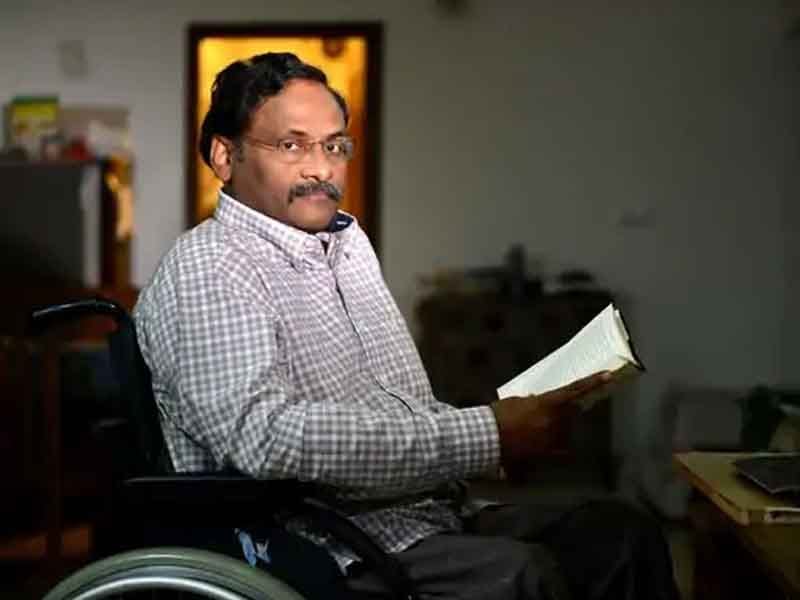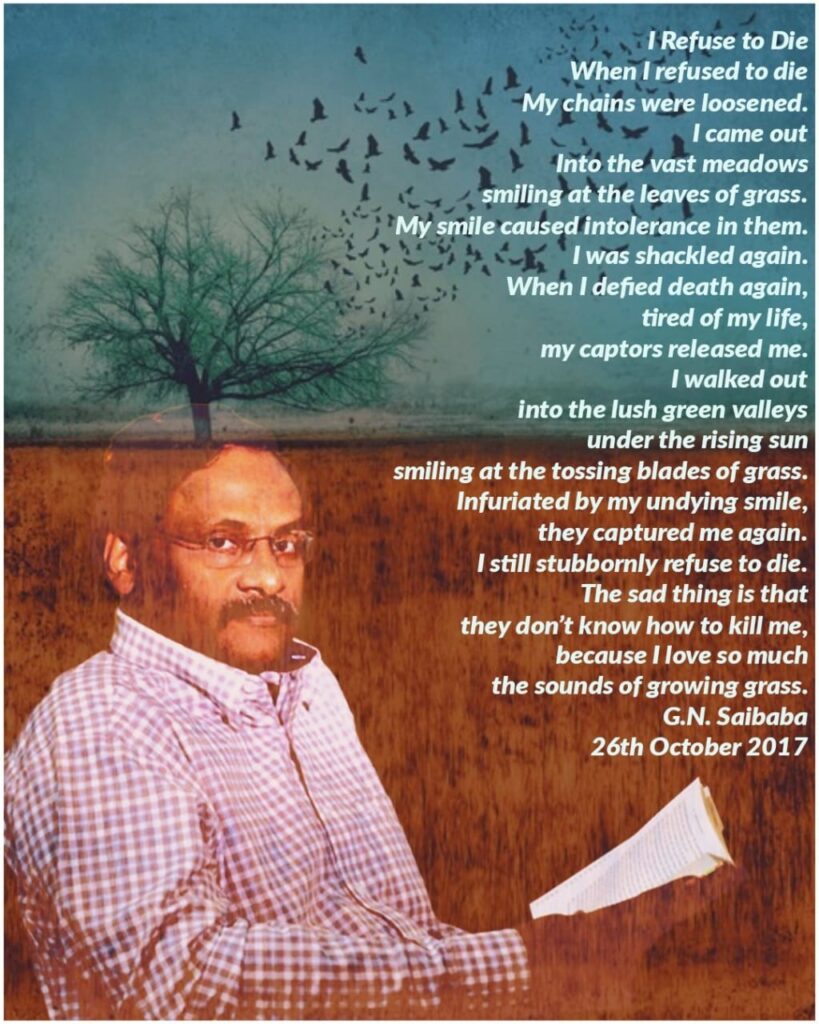
He was kept in the “Anda Cell,” where his wheelchair couldn’t even move fully. He had been 90% disabled since childhood and was dependent on a wheelchair. In the Anda Cell, there was a corner designated for urinating and defecating, but his wheelchair couldn’t reach that spot. He faced immense difficulties and suffering.
In the Anda Cell, prisoners who are considered terrorists, enemies of the state, and threats to national security are held. The prisoners in the Anda Cell do not receive the same facilities as the other prisoners. They are confined entirely to that cell, where their food is delivered, and they have to urinate, defecate, and sleep in that same space. The cell is completely sealed off, so they can’t tell whether it’s day or night.
He repeatedly petitioned for parole on medical grounds or to be placed under house arrest, but all his requests were denied. He spent ten years in prison. Before going to jail, he only had polio, which made him 90% disabled and reliant on a wheelchair. However, in prison, he faced such extreme difficulties that he developed several other major illnesses.
Just think about a man who is 90% disabled — how many struggles he must have faced in prison, and how he endured them. Daily, he faced problems just going to the bathroom. He had to get off his wheelchair and back onto it every time he wanted to sleep. There were countless other challenges he had to deal with daily.
In a letter, he told his wife that when he was arrested, they grabbed him by his left arm and pulled him so forcefully that his shoulder bones and muscles were damaged, rendering his left hand paralyzed. He contracted COVID twice and swine flu once while in prison. Now, he suffered from heart disease, kidney stones, intestinal twists, stomach lumps, and brain tumors, leaving him constantly in pain. In one letter, he mentioned that it was extremely cold in Nagpur, but he didn’t have a blanket, jacket, or sweater to keep warm. He was shivering and had a high fever. He had applied for bail and parole on medical grounds several times, but in ten years, he was only granted bail twice, once in 2015 and again in 2016.
In 2017, a sessions court in Gadchiroli convicted him and sentenced him to life imprisonment, after which he was kept in the Anda Cell of Nagpur Central Jail. Until March 2024, he was not granted any form of bail or parole, not even when his mother passed away so he could attend her last rites.
This is the story of Sai Baba — not the Sai Baba of Shirdi! This is the story of “Professor G.N. Sai Baba”! Professor G.N. Sai Baba was born in Amalapuram, Andhra Pradesh, in 1967. He had been 90% disabled since childhood. In 2003, he joined Delhi University’s Ram Lal Anand College as a professor of English. Sai Baba was deeply moved by the struggles of Dalits, the backward classes, and Adivasis, and he started fighting for their rights. He raised his voice for the rights of the Adivasis. A movement was launched under his leadership against the government’s orders allowing private companies to mine on Adivasi lands. As a result, he became a thorn in the eyes of both the government and capitalists.
In 2014, Maharashtra police arrested Sai Baba from Delhi on charges of having links with Naxalites and Maoists. He was booked under dangerous provisions like UAPA. Following his arrest, Ram Lal Anand College dismissed him from his position, and his family faced financial difficulties. However, many people and organizations who sought justice stood by him.
In interviews, Sai Baba spoke about the torment he faced in prison. He said that when he was arrested, his daughter was just 15 years old. Now, after ten years, she is 25. Everything changes in ten years. He lamented that he was made to rot in prison for ten years despite being innocent. Sai Baba tearfully recalled how his mother used to carry him to school every day when he was a child because of his disability, and her only dream was to educate him. When she passed away, the court did not grant him bail or parole to see her one last time or attend her funeral.
Sai Baba could have chosen to live a peaceful life if he had wanted. Being 90% disabled since childhood, he could have easily justified living a quiet life. No one would have questioned him. But Sai Baba set aside his disability and chose the path of justice and struggle, enduring immense suffering. However, he never bowed down to oppression.
If we look at other aspects of Sai Baba’s life, we see that just as his mother supported him fully during his childhood, his wife, Vasantha, stood by him through every hardship from his youth until his death. Vasantha’s story is also interesting. She says the first time she saw Sai Baba, he was walking on his hands, wearing sandals on his hands because both his legs were paralyzed. At that time, he couldn’t even afford a wheelchair. Vasantha says Sai Baba was very good at English, and she learned English from him. Slowly, after finishing her studies, Vasantha fell in love with Sai Baba, and one day, without telling anyone, she came to Sai Baba’s house, and the two were married. Vasantha had known Sai Baba since she was 15 years old, and she remained by his side until his death.
In 2022, a double bench of the Mumbai High Court acquitted Sai Baba, declaring him innocent. However, the Maharashtra government challenged this decision in the Supreme Court, which put a stay on the High Court’s ruling. The Supreme Court ordered the High Court to reconsider the case. Have you ever heard of a case where the High Court was made to start from scratch twice? This was the kind of injustice Sai Baba faced. In 2024, the Nagpur bench of the Mumbai High Court (double bench) again found Sai Baba innocent and ordered his release. Despite the ruling, excuses such as slow internet and delays in delivering the verdict copy kept him in prison for two more days.
Finally, in March 2024, Sai Baba was released from prison. When he went to jail, he was disabled only because of polio. But when he was released, he had several serious illnesses. Sai Baba attributes this to the lack of proper medical care in prison. His illnesses were not treated adequately. Sai Baba also pointed out that upper-caste and upper-class prisoners in jail receive excellent medical care, sometimes even at private hospitals, where lakhs of rupees are spent on their treatment. In contrast, Dalits, backward classes, Adivasis, and minorities are denied even basic medical facilities.

On October 12, 2024, Sai Baba passed away. Complications arising from a kidney stone surgery triggered his other illnesses, and he couldn’t be saved. Today, Sai Baba is no longer with us, but he left us with a lesson: if a 90% disabled man like Sai Baba could stand against oppression, anyone can. Sai Baba may never have stood on his own feet on the ground, but he always stood against the oppressors. He consistently fought for justice and rights throughout his life. Sai Baba’s entire life, from birth to death, was filled with struggle and perseverance. He showed the world that there are no barriers to standing up for justice, speaking the truth in front of oppressors, and fighting against injustice. If anyone chooses not to stand, not to speak the truth, they are simply cowards. Their excuses are nothing but mere pretexts.
As Professor G.N. Sai Baba said:
“This darkness does not last long; every darkness is eventually covered by the light of dawn!”


